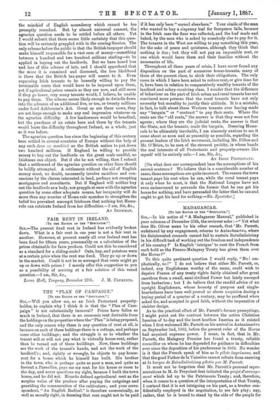THE "PLAN OF CAMPAIGN."
[To THE EDITOR OP THE " SPECTATOR.'] 8114—Will you allow me, as an Irish Protestant property- holder, to explain why I think it is that the " Plan of Cam- paign" is not substantially immoral ? Prices have fallen so much in Ireland, that there is no economic rent derivable from the holdings on the properties where the " Plan " is being proposed, and the only reason why there is any question of rent at all, is because on each of these holdings there is a cottage, and perhaps some other buildings ; and the struggle is as to whether the tenant will or will not pay what is virtually house-rent, rather than be turned out of these buildings. Now, these buildings are the work of the tenant's hands, and not the work of the landlord's ; and, rightly or wrongly, he objects to pay house- rent for a house which he himself has built. His brother in the town, who is perhaps quite as poor a man, and quite as fervent a Parnellite, pays me my rent for his house or room to the day, and never questions my right, because I built the town house, and he did not. Ricardo defined agricultural rent as the surplus value of the produce after paying the outgoings and providing the remuneration of the cultivators ; and your corre- spondent, "An English Radical," is therefore economically, as well as morally right, in deeming that rent ought not to be paid
if it has only been " earned elsewhere." Your simile of the man who wanted to buy a sixpenny loaf for fourpence fails, because in the Irish case the flour was collected, and the loaf made and baked, by the man who is asked by somebody else to pay for it. The tenants in the West are willing to pay something this year, for the sake of peace and quietness, although they think that nothing is due ; but they will not pay an impossible rent, or one which would leave them and their families without the necessaries of life.
Throughout all these years of crisis, I have never found any disposition on the part of numerous house-tenants, many of them of the poorest class, to shirk their obligations. The only cases in which I have been asked to reduce rent, or give time for it, have been in relation to comparatively wealthy tenants of the landlord and salary-receiving class. I wonder that the difference of behaviour on the part of Irish urban and rural tenants has not convinced more persons that the rural tenants have not only necessity but morality to justify their attitude. It is a mistake, in fact, to talk about these Western tenants ever having made any "bargain" or " contract " to pay their rents. Where the rents are the "old rents," the answer is that they were not free agents ; where they are the judicial rents, the answer is that the State, not the tenants, made the bargain. Deeming Home- rule to be ultimately inevitable, I am sincerely anxious to see it come about as soon and as peaceably as possible, regarding the present leaders of the Irish movement, including Mr. Dillon and Mr. O'Brien, to be men of the sternest probity, in whose hands the real interests of all Protestants and property-owners like myself will be entirely safe.—I am, Sir, &c., AN IRISH PROTESTANT.
[On what does our correspondent base the assumptions of his second sentence ? We believe that in a considerable number of cases, those assumptions are quite incorrect. The reason the town tenant pays his rent when he can, while the rural tenant pays it only when he must, is that the National League have not even endeavoured to persuade the former that he can get his house for nothing, and have persuaded the latter that he can and ought to get his land for nothing.—En. Spectator.]














































 Previous page
Previous page